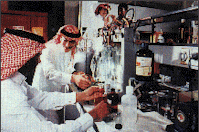|
|
Higher Education
 |
Students can now obtain quality education in almost any field at Saudi universities. |
Entering a new era of rapid development of the country's infrastructure and economy in the early 1970s, Saudi Arabia devoted special attention to fostering higher education. Established in 1975, the Ministry of Higher Education embarked on a long-term master plan to enable the Saudi educational system to provide the highly trained manpower necessary to run the country's increasingly sophisticated economy.
One of the first objectives was to establish new institutes of higher education throughout the country and expand existing ones. By 1994, there were seven major universities and 83 colleges. Another objective was to establish undergraduate and postgraduate programs in most disciplines at Saudi universities and colleges. As a result, Saudi students can now obtain degrees in almost any field within the country and, only if necessary, pursue specializations abroad.
In 1993, King Fahd, who has been closely associated with the development of education in Saudi Arabia for four decades, introduced new provisions for the Higher Education Council and the University System. The objective is to further improve the efficiency of Saudi universities by offering programs in new fields, encouraging greater cooperation among Saudi institutes of higher learning and increasing involvement of the teaching staff in the operations of faculties.
Today, there are more than 142,000 students at Saudi universities and colleges, a dramatic improvement over the 7,000 students enrolled in 1970. Of that number, more than 60,000 are female students studying at five of the universities -- King Saud, King Abdul Aziz, King Faisal, Imam Muhammad Bin Saud and Umm Al-Qura -- that accept both male and female students, and also at 14 colleges set up exclusively for women. A total of more than 10,200 teachers is employed at Saudi universities and colleges.
The oldest university in the country is King Saud University in Riyadh. When it first opened in 1957, there were only nine instructors teaching 21 students. Since then, more than 25,000 students have graduated. The university accommodates 24,400 students in its faculties of art, science, commerce, engineering, agriculture, medicine, dentistry, nursing, education, computer science and information science. It offers doctorate programs in many fields and is noted for its schools of engineering and medicine.
The Islamic University at Madinah, founded in 1961, serves as a center for Islamic studies and for teaching Islamic culture. It also offers programs in Arabic literature and the arts and the sciences. More than 8.000 students have graduated from the university, including non-Saudis from 105 countries. Imam Muhammad Bin Saud University in Riyadh and Umm Al-Qura University in Makkah offer programs in the various arts and sciences, including engineering, architecture, science and technology and education. Both are highly regarded for their Islamic law, history and Arabic literature. Imam Muhammad Bin Saud University has branches in the United States, Japan, Indonesia, Mauritania, Djibouti and United Arab Emirates offering programs in Islamic and Arabic studies.
The King Fahd University of Petroleum and Minerals, founded in Dhahran in 1963, enrolls approximately five thousand students. The university, considered to be on a par with the best in the world, offers programs in the modern sciences, including engineering, mathematical sciences, finance, economics and management and marketing. Its research institute conducts studies in a variety of fields, notably in petroleum technology and environmental issues.
King Abdul Aziz University in Jeddah was founded in 1967 by a group of Saudi businessmen who understood the importance of education in national development. The university developed so rapidly that in 1971, the founders petitioned the government to assume responsibility for its operation. Since then it has expanded considerably and now has more than 23,000 students enrolled in undergraduate and graduate programs in various fields of study.
King Faisal University, with two campuses in Dammam and Hofuf, offers a range of programs, including medicine, administrative science and architecture and urban planning. Founded in 1975, the university is famous for its outstanding agricultural and veterinary sciences programs. It has educational and experimental farms in Hofuf and conducts advanced research in agriculture and animal husbandry.
To complement their studies in universities in the Kingdom, Saudi students have the opportunity to pursue graduate and postgraduate degrees in specialized fields abroad. Supported by government scholarships, thousands of Saudi students are enrolled in universities outside the Kingdom, mainly in the United States.
One of the institutions that has been instrumental in the development of higher education in Saudi Arabia is the King Abdul Aziz City for Science and Technology. Dedicated to research in various fields, including education, it helps formulate the national policy for the development of science and technology, conducts applied scientific research and assists the private sector in research and development. .
|